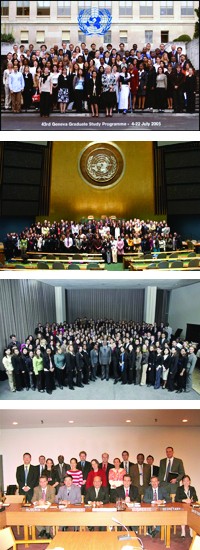A decade has passed since my time at the UNSC Sanctions Committees (2005-06). After the PhD training, I have come to realize that after obtaining the PhD, you are free to decide what you research.
At each stage of my life, I took up a new language – Korean was my native, English in elementary school, French in high school, Chinese in college, Japanese during masters, and Arabic when transitioning from masters to PhD. I must admit that my PhD training and fieldwork in Japan and China bolstered my language skills tremendously, to the level of professional proficiency.
Unfortunately, working on the Middle East for my PhD did not turn out well, and I instead worked on Northeast Asia for my PhD with the greatest mentors I could have. Indeed, my academic training on Northeast Asia and political economy is the very foundational training I have had that enables me to analyze the Middle East in relation to Northeast Asia and the US.

From top to bottom: With the 2005 GSP at the UNOG; with the 2005 UN Interns at the UNGA; with the 2006 UN Interns with former UNSG Kofi Annan; And with the Members of the UNSC Sanctions Committee established pursuant to UNSC RES 751.
For a decade, I missed my previous training on the Middle East and international security terribly. It felt like I was missing out on a big chunk of my regional interest. So the first thing I did when I came to Singapore was get in touch with the Middle East Institute and sign up for Arabic at the Centre for Language Studies at the National University of Singapore. It took a year to remain on that roster and finally pick it up again. I’m on my second year of my postdoctoral training now, and I can learn Arabic again in this new stage of life.
A decade ago, when I was working on sanctions at the UN, most of the people that I interacted with spoke Arabic or Farsi, and I was encouraged to learn Arabic. Unfortunately, the teacher I had when I first learned it was not a native speaker, and I regret that I started Arabic that way. The alphabet was also taught in a very fragmented manner, and ultimately led to difficulty in reading and loss of interest in the language training altogether. Fortunately, my current instructor at NUS CLS is a very experienced teacher from the American University of Cairo, and everything is sort of familiar because I learned it once, but easier.
Developing a new research interest is not always easy, but with this new phase I think it will go quite well, because ten years since my initial spark of interest on the Middle East, the world has become extremely intertwined, and the two regions – Northeast Asia and the Middle East are coming together economically, as the US influence wanes and China rises in the region. My goals are in producing scholarly work that will take the field of international relations one step further by linking the US-NEA-MENA regions.
